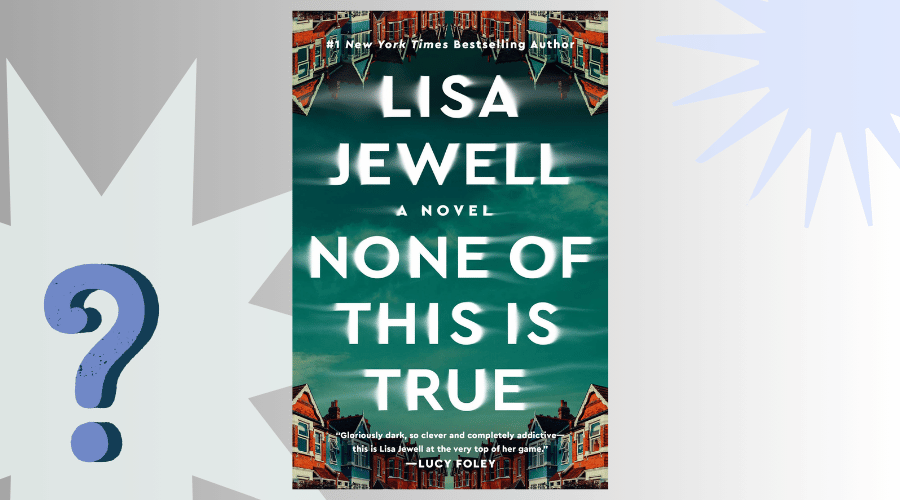None of This Is True is a great pick for book clubs. Its themes of manipulation, obsession, and unreliable narration lead to lively discussions. The modern, podcast-inspired format resonates with fans of true crime, and the morally complex characters spark debates on trust and trauma. Plus, the ambiguous ending leaves room for multiple interpretations, making it perfect for thought-provoking conversations.
None of This Is True: Discussion Questions
Here are some great discussion topics for None of This Is True by Lisa Jewell to spark conversation in your book club:
- Rich Discussion Themes: The book offers complex themes like manipulation, obsession, unreliable narratives, and the ethics of storytelling, especially through the lens of a true crime podcast. These themes spark great discussions around trust, morality, and personal boundaries.
- Engaging and Suspenseful Plot: The twists and secrets throughout the novel keep readers hooked, making it a page-turner that encourages lively debates about characters’ actions and motivations. Members will enjoy predicting outcomes and sharing interpretations of key events.
- Moral Ambiguity: Josie, one of the main characters, presents a fascinating case of moral grayness. Book club members can debate whether she’s purely manipulative or if her behavior stems from deeper trauma, providing multiple perspectives to explore.
- Timely and Relevant Format: With its podcast-inspired storytelling, the book feels very modern, resonating with readers familiar with the true crime craze. A club discussion can also include broader conversations about the ethics of true crime media.
- Open-Ended Questions: The novel’s ambiguous ending invites debate about what the truth really is and whether justice was served. These unresolved elements make for thought-provoking conversations and multiple interpretations.
Book Club Questions for None of This Is True
Here are some great discussion questions for None of This Is True by Lisa Jewell to spark conversation in your book club:
- What was your first impression of Josie and Alix? Did your perception of either character shift as the story progressed?
- How does the concept of “birthday twins” impact the plot?
What do you think Lisa Jewell intended to convey through this connection between Josie and Alix? - Josie’s character is morally ambiguous. Do you think her actions were driven by trauma or manipulation? Can readers feel any sympathy for her, or is she purely a villain?
- What are your thoughts on Alix’s decision to continue the podcast, despite red flags about Josie? What does it say about her character and the ethics of storytelling?
- How did the podcast format add to the suspense? Would the narrative have felt as engaging if it was told in a more traditional style?
- Trust and betrayal are key themes in the book. Which betrayal or hidden truth stood out the most to you, and why?
- The book ends with ambiguity. What do you believe really happened to Nathan and Brooke? Do you think Jewell deliberately left it open to interpretation?
- If Josie were a real person, how do you think her story would be received by the media or the public? Would people empathize with her or criticize her actions?
- How do class differences between Josie and Alix shape their relationship? How do these dynamics influence the way they interact and view each other?
- What role does social media play in the story? How does the way Josie lurks online reflect on her personality and relationships?
- Discuss the power imbalance between Josie and Alix. Do you think Alix was ever in control, or was Josie manipulating her all along?
- What was the most surprising twist for you? Did any part of the story challenge your assumptions or predictions?
- The book explores the ethics of true crime storytelling. Do you think Alix handled Josie’s story responsibly? What are the moral dilemmas in turning real people’s lives into entertainment?
- How do you interpret Josie’s actions toward her children? Was she trying to protect them, or was she selfishly acting in her own interest?
- If the book had been told from only one perspective, either Josie’s or Alix’s, how would that have changed your experience? Would the narrative have been as effective?
- The Netflix documentary concept plays a role in the plot. Do you think this story would work well as an actual Netflix adaptation, and what message would it send to viewers?
- What message do you think Lisa Jewell is trying to convey about memory and truth? Do you think we can ever really know the full truth about another person?
- How do the themes of jealousy and identity play out in Josie’s fascination with Alix? Do you think Josie genuinely wanted to change her life, or was her obsession purely destructive?
- Do you believe Alix’s podcast was an attempt at self-validation? In what ways does the podcast reflect her own personal struggles and insecurities?
- The relationship between Josie and Nathan is layered with manipulation. How did your opinion of Nathan evolve throughout the story? Did you see him as a victim or an enabler?
- How does the novel handle the concept of trust within families? What are the consequences of Josie’s lies on her children and family dynamics? Could any character truly be trusted by the end?
- What role do gender dynamics play in shaping the characters’ actions? Do you think the outcome would have been different if Alix or Josie were men?
- Discuss the title, None of This Is True. At what point did you begin to doubt the authenticity of the characters’ stories? How does the title shape your reading experience?
- How did the structure of the narrative, shifting between interviews and personal interactions, impact your reading? Did the alternating formats help build suspense, or did they create confusion?
- If you were in Alix’s shoes, at what point would you have cut ties with Josie?
Do you think Alix ignored the warning signs, or was she trapped by her own curiosity? - The ending leaves some events open to interpretation. Do you believe Josie’s version of events regarding Nathan’s death and Brooke’s fate? What other interpretations did your group come up with?
- How does the novel explore the theme of reinvention? What do you think motivated Josie to “start over” at the end of the book? Was it an escape, redemption, or just another manipulation?

